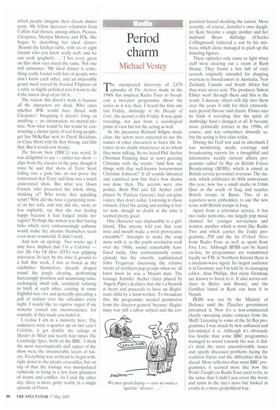Period charm
Michael Vestey
The unexpected discovery of 2,670 episodes of The Archers made in the 1960s has inspired Radio Four to broadcast a two-part programme about the series as it was then. I heard the first one last Friday, Ambridge in the Decade of Love, the second is this Friday. It was quite revealing, not just from a sociological point of view but for the acting as well.
As the presenter Richard Stilgoe made clear, the actors were expected to use the names of other characters to leave the listeners in no doubt whatsoever as to whom they were talking. So we heard Phil Archer (Norman Painting then as now) greeting Christine with the words: 'And how are things with that well-known horsewoman Christine Johnson?' It all sounds laboured and contrived now but that's how drama was done then. The accents were also posher. Both Phil and Jill Archer (still played by Patricia Greene) had cut-glass voices; they don't today. Listening to these extracts, I feel the acting and writing is better now, though no doubt at the time it seemed pretty good.
One character says implausibly to a girlfriend, 'Has anyone told you that your nose and mouth make a most provocative ensemble?' Attempts to make the soap more with it, as the youth revolution took over the 1960s, sound remarkably hamfisted today. One unintentionally comic episode has the smooth. sophisticated John Tregorran discussing the relative merits of northern pop groups when we all knew knew he was a Mozart man. The teenage Jennifer Archer (later played by Angela Piper) declares that she's a beatnik at heart and proceeds to have an illegitimate child by a farm-worker. To broadcast this, the programme needed permission from the director-general because illegitimacy was still a taboo subject and the cor poration feared shocking the nation. More recently, of course, Jennifer's own daughter Kate became a single mother and her husband Brian Aldridge (Charles Collingwood) fathered a son by his mistress, which alone managed to push up the listening figures.
These episodes only came to light when staff were clearing out a room at Bush House. They found a box full of vinyl records originally intended for shipping overseas to broadcasters in Australia, New Zealand, Canada and South Africa but they were never sent. The producer Simon Elmes went through them and this is the result. I daresay others will dip into them over the years if only for their extraordinary period flavour and charm. Elmes says he finds it revealing that the spirit of Ambridge hasn't changed at all. It became more politically correct in the 1990s, of course, and was sometimes absurdly so, but the acting is first-class today.
During the Gulf war and its aftermath I was monitoring media coverage and broadcasting reports for a thoughtful and informative weekly current affairs programme called Sit Rep on British Forces Broadcasting (BFBS), which is aimed at British service personnel overseas. The station, which celebrates its 60th anniversary this year, now has a small studio in Umm Oasr in the south of Iraq and reaches British troops in Basra. Two of its reporters were embedded, to use the new term, with British troops in Iraq.
Apart from a television service, it has two radio networks, one largely pop music channel for younger servicemen and women, another which is more like Radio Two and which carries the Today programme, PM and the Six O'clock News from Radio Four as well as sport from Five Live. Although BFBS can be heard on-line, its programmes are transmitted locally on FM; in Northern Ireland there is a medium-wave signal. Its largest audience is in Germany and I'm told by its managing editor, Alan Phillips, that many Gentraus are known to listen to it. It also serves soldiers in Belize and Brunei, and the Gurkhas based in Kent can hear it in Nepali.
BFBS was run by the Ministry of Defence until the Thatcher government privatised it. Now it's a non-commercial charity operating under contract from the MoD. Listening to some of the Sit Rep programmes I was struck by how unbiased and fair-minded it is. Although it's obviously less hostile than some BBC programmes managed to sound towards the war, it didn't shirk the more uncomfortable issues and openly discussed problems facing the coalition forces and the difficulties that lie ahead. More reflective than most BBC programmes, it seemed more like how the World Tonight on Radio Four used to be, in the sense that it didn't just cover the twists and turns in the day's news but looked at events in a more geopolitical way.


































































































 Previous page
Previous page